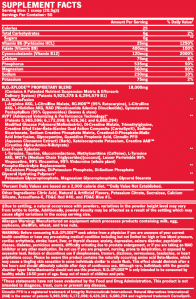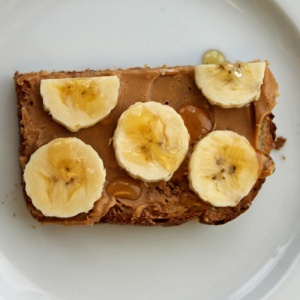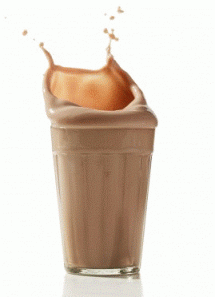I do a lot of early morning bootcamps, and some of clients need help with nutrition for first thing in the morning. You need FUEL to work out properly when you are starting an intense workout at 6am, or any other time of the day! Here are some general recommendations for pre & post workout nutrition in order to really see those results and time you are putting in your workouts in the gym!

Another question I have is “Should I take a pre-workout?” If you hang out at the gym quite a bit you may see people mixing some sort of concoction before a workout, or perhaps you’ve heard of the energy you can get from taking one of these. Some of the popular pre-workout mixes are “N.O. Explode” or “Superpump” which is essentially a blend of high doses of caffeine, creatine, niacin, Vitamin B, taurine, ginseng.. It’s basically an energy drink on steroids. I actually used to take things like this before I started learning about nutrition and now I don’t recommend them. With a proper nutrition plan you should have plenty of energy to power your workouts without a bunch of chemicals! They usually will end up making you shaky, reliant on them, restless, and unable to sleep at night. So I would avoid these and stick with a healthy dose of carbs to power through your workout- or if you are exhausted and can’t muster up the energy to push at the gym- DON’T GO! Listen to you body and take the rest when you need it 🙂
The only thing I would recommend as far as “supplements” go is plain old caffeine. Have a cup of coffee to get you going- caffeine is the only supplement actually proven to increase endurance, increase the pain threshold (so workouts seem easier), and heightened awareness & focus. Caffeine is considered safe for most adults, and a daily intake of up to 450mg has no adverse effects. Here is the caffeine content of some common drinks:
Grande Coffee 250-330mg
Home brewed 8oz coffee: 80-100mg
Espresso: 100mg
Brewed Black Tea: 50mg
Pop: 35-55mg
Coffee ice-cream: 45-60mg (don’t have this before bed! haha)
We want to promote additional glycogen synthesis, supply body with blood glucose during exercise, and minimize fatigue.
When engaging in strength training, a pre-workout meal has been shown to increase total work capacity, especially for higher volume, longer duration workouts.
Avoid foods that may cause gastrointestinal distress such as foods high in fat and fiber, milk products for lactose-intolerant athletes, acidic fruit juices, highly fortified meal replacement beverages, or unfamiliar foods.
Type of meal/snack when in between competitions (such as in a power-lifting meet) depends primarily on the time available. If you are short on time, a liquid choice may be best to avoid a very full stomach. Choose something high in carbohydrate, moderate in protein and lower in fat and fiber. You can also consider a lower GI meal that will help to keep blood sugar levels more stable during exercise.
If a second exercise bout is going to occur within 6 hours, it is beneficial to consume 75-90g of carbohydrate immediately post-exercise to help with rapid glycogen restoration.
Aim to have your pre-workout meal 2-4 hours prior to exercise.
A good rule of thumb for carbohydrate before exercise is:
4 hours before = 4g/kg (body weight)
3 hours before = 3g/kg
2 hours = 2g/kg
etc…
Aim for 100-300g range pre-workout, especially when aiming for a longer workout, or one with a higher intensity that is lasting longer than 30 minutes
-If you are eating immediately before, be aware that hypoglycaemia (light-headedness, dizziness, inability to concentrate, nausea, irritability, fatigue) may be at risk. This happens with individuals that are prone to hypoglycaemia. When you consume a high carbohydrate meal and in turn have high blood insulin levels immediately before exercise, then a decline in blood glucose levels may occur at the onset of exercise, resulting in pre-mature fatigue. Blood glucose decreases because of elevated blood insulin levels due to carb feeding, which stimulates the uptake of glucose by tissues at the same time that exercise causes a uptake of glucose, and the liver output of glucose may be low. This is known as rebound hypoglycaemia. Most athletes do not have this problem, but it is good to be aware!
Easy foods to eat pre-workout:
Clif Bar: 44g carbs, 5g fat, 10g protein, 245 calories
Banana: 23g carbs, .3g fat, 1.1. protein, 110 calories
Whole wheat toast & tbsp peanut butter: 13.5 carbs, 9.0g fat, 5g protein, 168 calories
Lara Bar: 24g carbs, 11g fat, 5g protein
1/4 cup steel cut oats & berries: 22g carbs, 1g fat, 4g protein, 122 calories
If you are getting up and heading straight for a workout within 30 minutes, a simple piece of fruit could make the difference between a great workout or a low-energy one.
Another thing to make sure you have enough of is WATER! Even a slight amount of dehydration is going to really reduce your energy and endurance- so make sure you are always drinking lots of water all day!
Goals of the post-workout meal:
-Aids in recovery, reduce skeletal muscle breakdown, restore glycogen, synthesize protein, and rebuild tissues.
–Aim to consume a higher glycemic carb with protein post workout. Carb will stimulate insulin which stimulates amino acid uptake into muscle, and inhibits muscle degradation.
-Since you are in an anabolic state post exercise, this is the prime time for skeletal muscle growth. 30 min- 2 hours post exercise is the best window for replacing energy stores and allow for the body to synthesize protein instead of breaking it down.
-Protein consumption post exercise supports muscle growth but there is no evidence that it increases strength/power or changes body composition.
-For maximum protein synthesis aim for 20g of high quality protein; preferably a blend of casein and whey which allows for a slower more sustained release (casein) as well as fast acting (whey). Casein will help to suppress skeletal muscle breakdown.
Easy Ideas:
-Scoop of whey/casein blend with 1 cup of chocolate milk
-Higher protein meal if it falls within meal time: Meat + vegetables + brown rice
-Omelette with 2 eggs, egg whites + vegetables
-Cottage cheese/plain greek yogurt + nuts + berries
-Protein pancakes
I hope this helps you to train your best the next time you step in the gym, and recover better!



